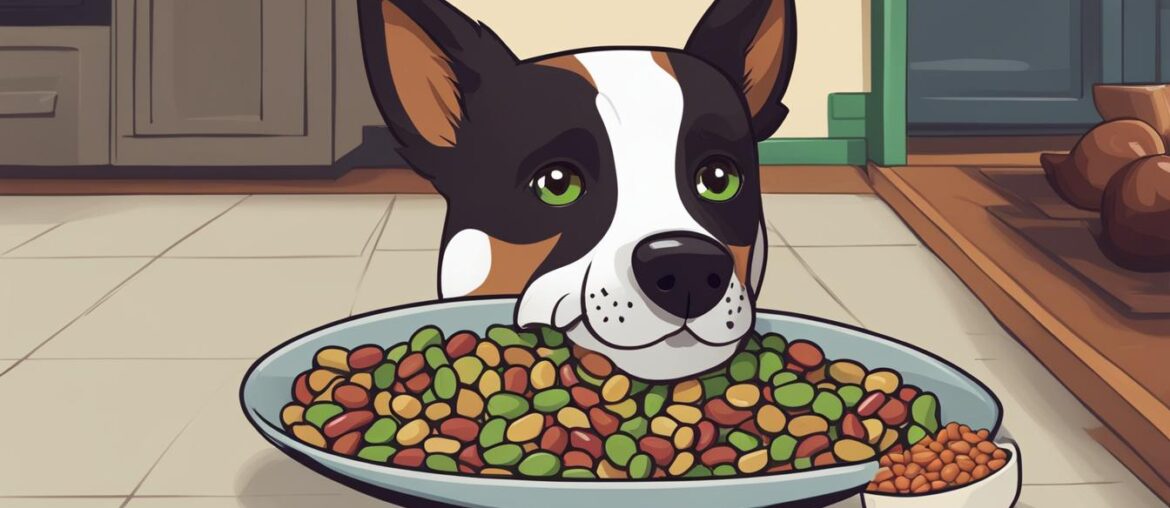I’m here to answer a common question that many dog owners have: Can dogs eat beans? Beans are a staple in many human diets, but what about our furry friends? In this article, I will delve into the safety of beans for dogs, discuss the types of beans that are safe for them to consume, and highlight the potential risks associated with feeding beans to dogs.
Dogs, like humans, have unique nutritional needs. While some types of beans can provide health benefits to dogs, it is crucial to understand which beans are safe and how they should be prepared before offering them to your pet.
Before we dive deeper into this topic, let’s address the primary question: Are beans bad for dogs? The answer is not a simple yes or no. While some beans can be a healthy addition to their diet, others can pose risks to their health.
Key Takeaways:
- Beans can be safe and nutritious for dogs when cooked and prepared properly.
- Black beans, kidney beans, pinto beans, green beans (legume), and other specific types of beans are generally safe for dogs to eat in moderation.
- It is crucial to avoid beans cooked in seasonings, sauces, or with potentially harmful ingredients like onion or garlic.
- Certain beans, such as baked beans, refried beans, and chili beans, should be avoided due to their high levels of seasonings and additives.
- Always monitor your dog for any allergic reactions or digestive issues when introducing beans into their diet.
Types of Beans Safe for Dogs
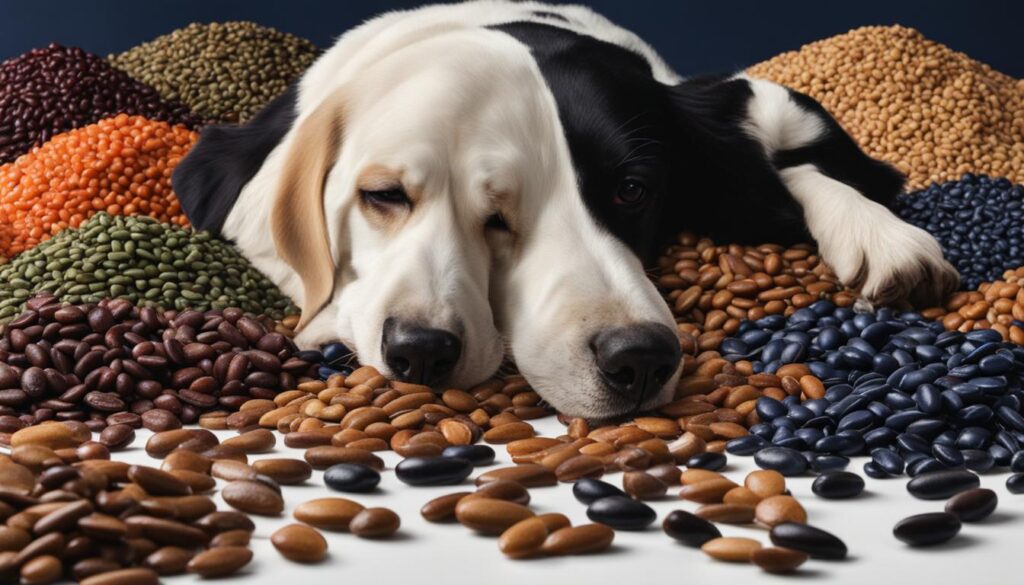
When it comes to feeding beans to your furry friend, it’s essential to know which types are safe and suitable for dogs. Here are some of the beans that are generally considered safe for dogs when cooked and prepared properly:
- Black beans
- Kidney beans
- Cannellini beans
- Lima beans
- Edamame
- Pinto beans
- Soy beans
- Haricot or navy beans
- Green beans (technically a legume)
It’s important to note that while beans can be a healthy addition to your dog’s diet, they should only make up a small portion, less than 10%, of their overall diet. Too much beans can lead to digestive upset or imbalances in their nutrition.
If you plan to feed your dog canned beans, make sure to rinse them thoroughly to remove excess sodium and sugars before serving. Additionally, avoid giving them beans that are cooked in seasonings or sauces that may contain ingredients toxic to dogs, such as onion or garlic. Keeping the beans plain and simple is the best way to ensure your dog’s safety and well-being.
For a visual representation of the types of beans safe for dogs, see the table below:
Benefits of Beans for Dogs
Beans can provide several benefits to dogs when included as part of a balanced diet. They are a good source of protein, antioxidants, fiber, and essential vitamins and minerals. The protein in beans can help support muscle growth and repair, while the fiber aids in digestion and promotes healthy bowel movements. The antioxidants in beans can boost your dog’s immune system and help protect against certain diseases. Additionally, beans are low in calories, making them a healthy and nutritious snack for dogs.
To summarize, the benefits of beans for dogs include:
- Protein for muscle growth and repair
- Fiber for digestion and healthy bowel movements
- Antioxidants for boosting the immune system
- Essential vitamins and minerals
- Low in calories for weight management
Feeding beans in moderation as part of a balanced diet can provide these nutritional benefits for your furry friend. However, it is important to remember that beans should not be the primary source of nutrition for dogs, as they have specific dietary needs that require a balance of animal-based proteins. It is always recommended to consult with your veterinarian for personalized advice on feeding beans and other food items to your dog.
| Benefits of Beans for Dogs |
|---|
| Protein for muscle growth and repair |
| Fiber for digestion and healthy bowel movements |
| Antioxidants for boosting the immune system |
| Essential vitamins and minerals |
| Low in calories for weight management |
Risks of Feeding Beans to Dogs
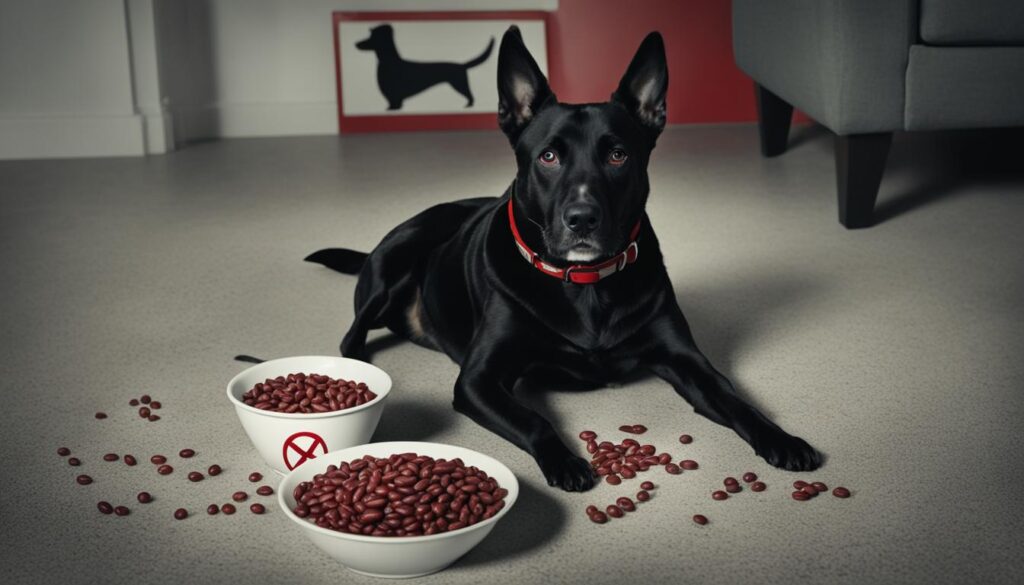
While cooked beans can be safe for dogs to eat, there are some potential risks associated with feeding them to your furry friend. It’s essential to be cautious and aware of these risks to ensure the well-being of your dog.
- Digestive Issues: Some dogs may have difficulty digesting beans, which can lead to gas, bloating, or an upset stomach. If you notice any digestive issues after feeding your dog beans, it’s important to consult with a veterinarian to determine the best course of action.
- High Seasonings and Ingredients: Certain types of beans, such as baked beans, refried beans, and chili beans, should be avoided when feeding dogs. These beans often contain high levels of seasonings and ingredients that can be harmful to dogs, such as onion or garlic.
- Toxicity: Coffee beans, or any form of caffeine, are extremely toxic to dogs. Ingesting coffee beans can lead to caffeine poisoning, which can be life-threatening. It’s crucial to keep all caffeine-containing products, including coffee beans, out of reach of your dog.
Feeding beans to dogs can have potential risks. It’s important to introduce beans gradually into their diet, avoid certain types of beans with high seasonings, and never allow your dog to consume coffee beans or any form of caffeine.
Safe Preparation of Beans for Dogs
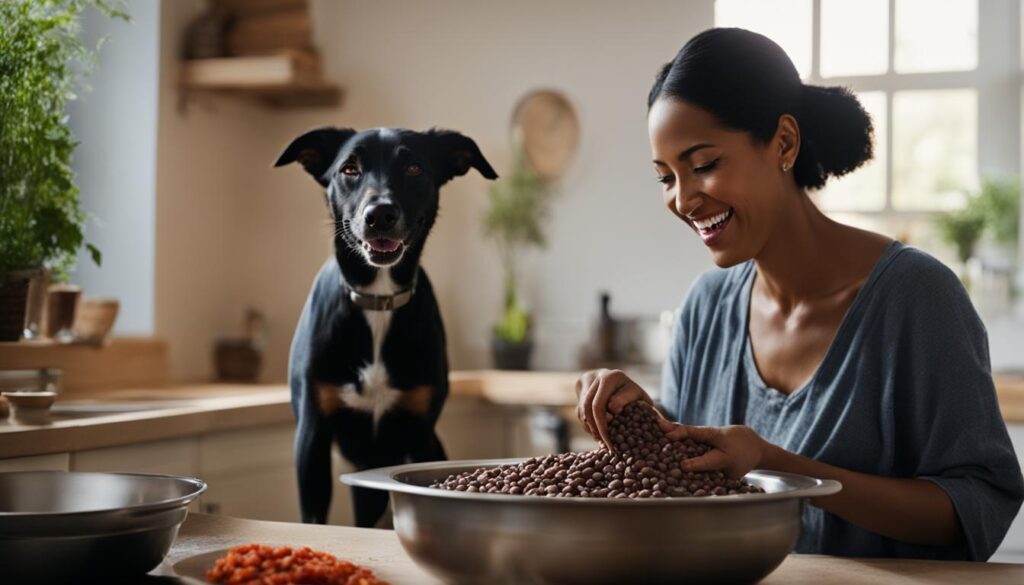
When it comes to preparing beans for your furry friend, there are a few important steps to ensure their safety and digestibility. Follow these guidelines to ensure your dog can enjoy beans without any issues:
Cook Thoroughly
Make sure to cook the beans thoroughly until they are soft and easily digestible. This will help prevent any potential digestive issues and ensure the beans are safe for your dog to consume.
Avoid Seasonings, Butters, and Fats
When cooking beans for your dog, it’s crucial to avoid using any seasonings, butters, or fats. These ingredients can be harmful to dogs and may cause digestive upset or other health issues. Stick to plain, unseasoned beans when preparing them for your furry friend.
Rinse Canned Beans
If you choose to use canned beans, make sure to rinse them thoroughly before feeding them to your dog. This will help remove any excess sodium and sugars that can be present in canned beans. Rinse them under cold water until the water runs clear before serving.
Cool Down Before Serving
Before offering the beans to your dog, ensure that they have cooled down completely. Even if the outside feels cool to the touch, the inside of the beans may retain heat. Allowing them to cool down will prevent any burns or discomfort for your furry friend.
By following these steps, you can safely prepare beans for your dog and provide them with a nutritious and delicious addition to their diet.
| Safe Preparation Tips for Beans | |
|---|---|
| Cook beans thoroughly until they are soft and easily digestible. | |
| Avoid using seasonings, butters, and fats when cooking beans. | |
| Rinse canned beans to remove excess sodium and sugars. | |
| Allow the beans to cool down completely before serving. |
Beans to Avoid Feeding Dogs
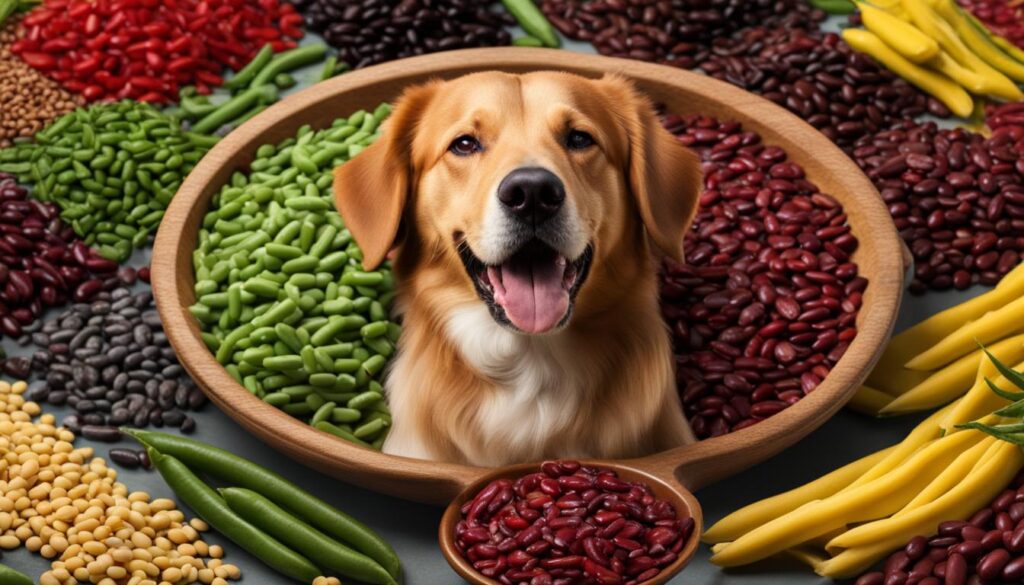
While many types of beans are safe for dogs, it’s important to be aware of the beans that should be avoided in their diet. Feeding certain beans to dogs can pose risks due to the high levels of seasonings and potentially harmful ingredients they may contain.
Baked beans, refried beans, and chili beans are among the beans that should not be fed to dogs. These types of beans often contain seasonings, such as onion and garlic, which can be toxic to dogs. Additionally, the high levels of sodium and sugars in these beans are not suitable for a dog’s diet.
Raw or dried beans are also not recommended for dogs. These beans can be difficult to digest and may even pose a choking hazard to your furry companion.
If you’re uncertain about whether a particular bean is safe for your dog, it’s best to err on the side of caution and consult with your veterinarian.
To give you a better understanding, here’s a table summarizing the types of beans to avoid feeding dogs:
| Types of Beans to Avoid Feeding Dogs |
|---|
| Baked beans |
| Refried beans |
| Chili beans |
| Raw beans |
| Dried beans |
Signs of Allergic Reactions in Dogs
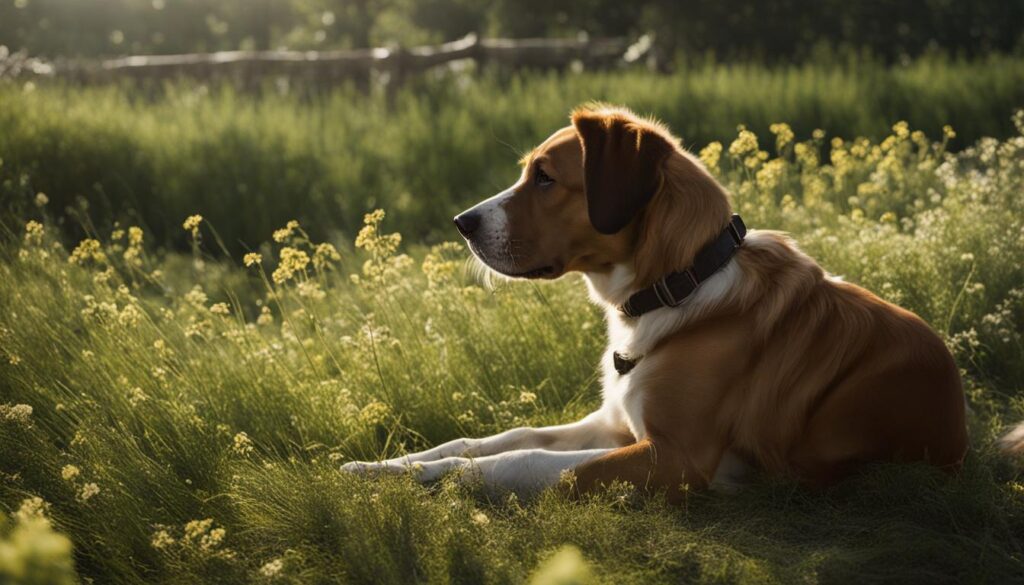
Dogs, like humans, can have allergic reactions to certain foods, including beans. It is important to monitor your dog closely when introducing new treats and watch for signs of an allergic reaction. These signs may include:
- Changes in breathing
- Itchiness
- Swelling of the lips or eyes
- Upset stomach
- Vomiting
- Diarrhea
- Draining eyes
If you suspect that your dog is having an allergic reaction, it is best to consult with your veterinarian for further guidance.
| Allergic Reaction Signs in Dogs |
|---|
| Changes in breathing |
| Itchiness |
| Swelling of the lips or eyes |
| Upset stomach |
| Vomiting |
| Diarrhea |
| Draining eyes |
Why is it important to monitor your dog for signs of an allergic reaction?
Bean allergies can manifest in various ways in dogs, and it is crucial to recognize these signs to ensure your dog’s well-being. If your dog experiences any of the aforementioned symptoms after consuming beans, it may indicate an allergic reaction. Prompt veterinary assistance is essential in order to properly diagnose and manage the allergy, as well as to prevent the occurrence of any potentially life-threatening reactions.
Beans and Canine Nutrition
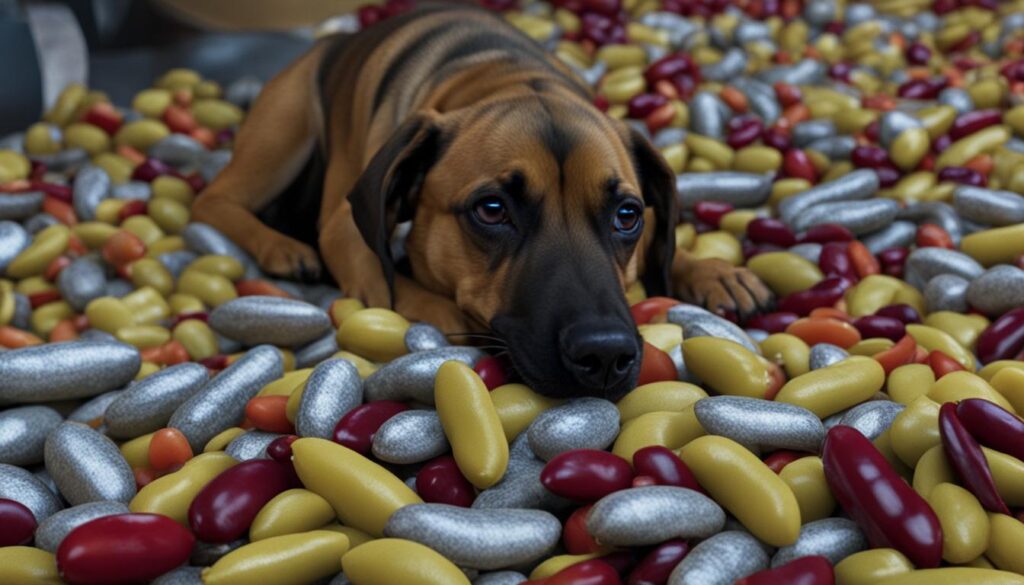
While beans can provide some health benefits to dogs, they should not be a staple or primary source of nutrition. Dogs have specific dietary needs that require a balance of animal-based proteins.
Feeding your dog a complete and balanced diet is crucial to ensure they receive all the necessary nutrients. While beans can be a nutritious addition, they should only be a small portion of your dog’s overall diet.
It’s important to note that not all beans are suitable for dogs. Some beans, such as chickpeas, peas, and lentils, contain anti-nutrients that can interfere with nutrient absorption and potentially lead to health issues. These anti-nutrients can affect your dog’s ability to obtain essential vitamins and minerals from their food.
Benefits of Beans for Dogs
Beans do offer some benefits to dogs when consumed in moderation. They are a good source of protein, which is essential for muscle growth and repair. Beans also contain fiber, which aids in digestion and promotes a healthy digestive system.
In addition to protein and fiber, beans also provide antioxidants, vitamins, and minerals. These nutrients help support your dog’s overall health and immune system, protecting them against certain diseases.
However, it’s crucial to remember that beans should not replace animal-based proteins in your dog’s diet. Animal proteins provide essential amino acids that dogs need for optimal health.
Risks of Feeding Beans to Dogs
While beans can offer health benefits, there are some risks associated with feeding them to dogs. Some dogs may have difficulty digesting beans, leading to gastrointestinal issues such as gas, bloating, or an upset stomach.
Additionally, certain types of beans, like baked beans or those cooked with seasonings and ingredients harmful to dogs, should be avoided. Onions, garlic, and high levels of sodium can be toxic to dogs and cause serious health problems.
It’s always best to introduce any new food, including beans, to your dog’s diet gradually. Monitor their reaction for any signs of digestive issues or allergic reactions.
Can Dogs Eat Beans? Yes, but with Caution
While beans can be a healthy occasional treat for your dog, they should not be a significant part of their diet. It’s essential to prioritize a balanced diet that meets your dog’s specific nutritional needs. Consult with your veterinarian to determine the appropriate amount of beans to include in your dog’s diet.
Why Sundays For Dogs Is a Nutritious Choice
Sundays For Dogs offers a nutritious choice for dog owners who want to provide their furry friends with a balanced and healthy diet. Their products are specifically formulated to meet the nutritional needs of dogs, ensuring they receive the essential nutrients for optimal health and well-being.
Unlike some types of beans, Sundays For Dogs’ meals do not contain any negative fillers or potential anti-nutrients that may be harmful to dogs. Instead, their meals are made with high-quality ingredients, including USDA grade beef and real plant-based nutrients sourced from fruits and vegetables.
By choosing Sundays For Dogs, you can have peace of mind knowing that you are feeding your dog a high-quality and safe meal. Their products are carefully crafted to provide a balanced combination of protein, carbohydrates, and essential vitamins and minerals, promoting overall health and vitality for your canine companion.
| Benefits of Sundays For Dogs | Features |
|---|---|
| 100% Natural Ingredients | Every meal is made with natural, wholesome ingredients, free from artificial fillers and additives. |
| Complete and Balanced Nutrition | Sundays For Dogs’ meals are formulated to provide the necessary nutrients dogs need for optimal health, including vitamins, minerals, and healthy fats. |
| Easy Digestibility | The ingredients used in Sundays For Dogs meals are easily digestible, reducing the risk of digestive issues and ensuring maximum nutrient absorption. |
| Customized Meal Plans | Sundays For Dogs offers personalized meal plans tailored to your dog’s specific needs and dietary preferences, ensuring they receive the right amount of food based on their age, size, and activity level. |
| Convenient Delivery | Sundays For Dogs delivers their meals directly to your doorstep, making it easy and convenient to provide your dog with a nutritious diet without the hassle of shopping and meal preparation. |
Wrapping Up
In conclusion, beans can be a safe and healthy addition to your dog’s diet when cooked and prepared properly. Certain types of beans, such as black beans and kidney beans, are generally safe for dogs to eat in moderation. They provide valuable nutrients like protein, fiber, and essential vitamins and minerals.
However, it is important to avoid certain beans that are cooked in seasonings or contain potentially harmful ingredients, such as baked beans, refried beans, or chili beans. These may have high levels of sodium, sugars, or toxic substances that can be harmful to your dog’s health.
When introducing beans into your dog’s diet, it is crucial to monitor them for any allergic reactions or digestive issues. Some dogs may have difficulty digesting beans, leading to gas or upset stomach. It’s always best to consult with your veterinarian for personalized advice and guidance on feeding beans to your dog.
Remember, while beans can provide some health benefits to dogs, they should not be a staple or primary source of nutrition. It is important to feed your dog a complete and balanced diet that meets their specific nutritional needs. Your veterinarian can help you determine the best diet plan for your furry friend.
FAQ
Are beans bad for dogs?
Beans can be a safe and healthy addition to your dog’s diet when cooked and prepared properly.
What types of beans are safe for dogs?
The types of beans that are generally safe for dogs to eat when cooked and prepared properly include black beans, kidney beans, cannellini beans, lima beans, edamame, pinto beans, soy beans, haricot or navy beans, and green beans.
Can dogs eat cooked beans?
Yes, cooked beans can be safe for dogs to eat if they are cooked thoroughly until they are soft and easily digestible.
Can dogs eat canned beans?
Canned beans can be used for dogs as long as they are rinsed thoroughly to remove excess sodium and sugars.
What are the benefits of beans for dogs?
Beans can provide several benefits to dogs when included as part of a balanced diet. They are a good source of protein, antioxidants, fiber, and essential vitamins and minerals.
What are the risks of feeding beans to dogs?
While cooked beans can be safe for dogs to eat, there are some potential risks associated with feeding them. Some dogs may have difficulty digesting beans, leading to gas or upset stomach.
How should I prepare beans for my dog?
When preparing beans for your dog, it is important to cook them thoroughly until they are soft and easily digestible. Avoid using any seasonings, butters, or fats when cooking beans for your dog.
What types of beans should I avoid feeding my dog?
Baked beans, refried beans, and chili beans should be avoided due to their high levels of seasonings and potentially harmful ingredients. Raw or dried beans should also never be given to dogs.
What are the signs of allergic reactions in dogs?
Signs of allergic reactions in dogs may include changes in breathing, itchiness, swelling of the lips or eyes, upset stomach, vomiting, diarrhea, or draining eyes.
How do beans fit into a dog’s nutrition?
While beans can provide some health benefits to dogs, they should not be a staple or primary source of nutrition. Dogs have specific dietary needs that require a balance of animal-based proteins.
Why is Sundays For Dogs a nutritious choice for dogs?
Sundays For Dogs offers a nutritious choice for dog owners who want to provide their furry friends with a balanced and healthy diet. Their products do not contain any negative fillers or potential anti-nutrients found in certain types of beans.


